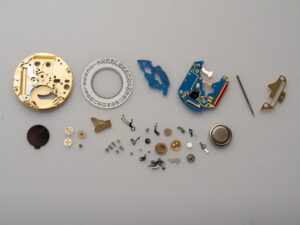A quartz watch is a type of electronic timepiece that utilizes a quartz crystal to keep time. These watches are incredibly accurate, reliable, and have become a popular choice for both everyday wear and special occasions. In this blog post, we’ll look into the details of how a quartz watch works, from the components that make up the watch to the inner workings of the quartz crystal.
Firstly, let’s take a look at the components of a quartz watch. A quartz watch consists of four main components: a battery, a quartz crystal, an integrated circuit, and a stepping motor. The battery provides the electrical power that drives the watch, while the quartz crystal serves as the timekeeping element. The integrated circuit is responsible for processing and regulating the electronic signals, and the stepping motor is what drives the hands of the watch.
So how exactly does the quartz crystal keep time? Quartz is a crystalline mineral that is piezoelectric, meaning that when it is bent or pressed it generates an electrical charge. This property also works the opposite way round, so by applying an electrical current to the quartz crystal it will vibrate at a specific frequency. The frequency of the quartz crystal is incredibly stable, and it will oscillate at the same frequency regardless of external conditions such as temperature or humidity.

The oscillations of the quartz crystal are then sent to the integrated circuit, which acts as the brain of the watch. The integrated circuit processes the electrical signals and sends a series of pulses to the stepping motor. The stepping motor then converts the pulses into rotational energy, which drives the wheel train and ultimately moves the hands of the watch.
One of the advantages of a quartz watch over a mechanical watch is its accuracy. While a mechanical watch may lose or gain several seconds per day, a quartz watch can keep time to within a few seconds per month. This is in part because the quartz crystal oscillates at a very high frequency (32768 Hz) compared to a mechanical watch where the balance oscillates at a far lower frequency – 2.5-4Hz. Additionally, quartz watches are more reliable than mechanical watches since they have fewer moving parts that are susceptible to wear and tear.
Quartz watches can also incorporate additional features, such as a digital display, chronograph functions, and alarms. These functions are all controlled by the integrated circuit and stepping motor, making them easy to operate and accurate.
Another advantage of quartz watches is their affordability. While high-end mechanical watches can cost thousands or even tens of thousands of pounds, a quartz watch can be purchased for a fraction of the price. This makes quartz watches a popular choice for those who want an accurate and reliable timepiece without breaking the bank.
To summarise – a quartz watch is a reliable and accurate timepiece that utilizes a quartz crystal to keep time. The electrical current applied to the quartz crystal causes it to vibrate at a specific frequency, which is then processed by the integrated circuit and converted into rotational energy by the stepping motor. The result is a watch that keeps time accurately and reliably.
It should be noted that quartz watches do require occasional maintenance and servicing. When we assess a quartz watch we check for factors such as the power consumption of the movement. If a watch is draining batteries very quickly, this may be a sign that it needs a service. Despite what some watch repair shops say, many quartz watches can be serviced, while a few require complete replacement movements if there is a problem.
Do you have a quartz watch in need of attention? If so, get in touch and see how we can help. We offer a fully insured freepost watch repairs service and we serve clients all around the UK, as well as to customers local to us in Lewes and Uckfield, Sussex. As holders of a Feefo Platinum Trusted Service Award and business partners of the British Horological Institute you can be confident in the service we provide.
Yours sincerely
David Clark FGA DGA MJVA PJDip. PJGemDip.
Managing Director, JVA Registered Valuer®
W.E. Clark & Son Limited
